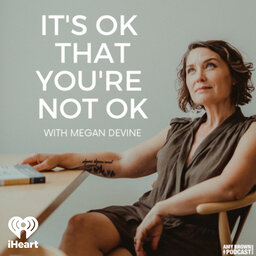Horse Barbie & Cultivating Trans Joy with Geena Rocero
Can you hide in plain sight?
From trans beauty pageants in the Philippines, to the catwalks of New York City fashion week, to the Ted Talk mainstage – Filipina-American model Geena Rocero has lived an astounding life. This week on It’s OK that You’re Not OK, the author of Horse Barbie: A Memoir shares what it costs to suppress your true self in order to find safety and success, and why joy is powerful medicine.
Geena Rocero is a trans advocate, speaker, and author of the new book, Horse Barbie.
In this episode we cover:
- Why do we have to talk about gender all the time anyway?
- How can parents support trans children?
- The history of trans beauty pageants in the Philippines
- The grief involved in hiding your true self in order to stay safe
- Why joy - and a sense of humor - are real survival tools
Related episodes:
Coming Home to Yourself with Alex Elle
If I Survived, You Can Too! Author Emi Nietfeld on the Hollowness of the Transformation Narrative
Over and Over Again: Illustrator Aubrey Hirsch on the Power of Storytelling
Notable quotes:
“Surviving means feeling a sense of a life well lived.” - Geena Rocero
“Live your most unapologetic self. Tell that story, in the only way you know. And live that life, in the only way you know… because that’s really the only way we’ll get through this.” - Geena Rocero
About our guest:
Geena Rocero is a Filipina-American model, public speaker, author, and trans rights advocate. Ms. Rocero made history as the first trans woman ambassador for Miss Universe Nepal, and the first trans Asian Playboy Playmate of the Year. Her TED Talk, “Why I Must Come Out,” has been viewed over 3.7 million times. She’s an advisory board member of SeeHer, a global coalition working to increase representation and accurate portrayal of all women and girls in marketing, media, and entertainment. She’s spoken at the White House and United Nations, and has been featured on CNN, MSNBC, Glamour, Cosmopolitan, Vanity Fair, and Variety. Her book Horse Barbie: A Memoir was named one of the Best Memoirs of 2023 by Elle Magazine.
Find her @geenarocero on Instagram, Facebook, and Twitter
About Megan:
Psychotherapist and bestselling author Megan Devine is recognized as one of today’s most insightful and original voices on grief, from life-altering losses to the everyday grief that we don’t call grief. She helms a consulting practice in Los Angeles and serves as an organizational consultant for the healthcare and human resources industries.
The best-selling book on grief in over a decade, Megan’s It’s Ok that You’re Not OK, is a global phenomenon that has been translated into more than 25 languages. Her celebrated animations and explainers have garnered over 75 million views and are used in training programs around the world.
Additional resources:
Watch Geena’s TED Talk “Why I Must Come Out”
Read Geena’s book - Horse Barbie: A Memoir
Want to become a more grief-informed, human-centered therapist or provider? Registration is open now for Megan Devine’s 6 month online Grief Care Professional Certificate Program. Details at this link.
Want to talk with Megan directly? Join our patreon community for live monthly Q&A sessions: your questions, answered.
Check out Megan’s best-selling books - It’s OK That You're Not OK and How to Carry What Can’t Be Fixed
Books and resources may contain affiliate links. For a collection of all the books mentioned in the history of the show (plus other things we think are interesting or helpful), visit the affiliate store.
Get in touch:
Thanks for listening to this week’s episode of It’s OK that You’re Not OK. Tune in, subscribe, leave a review, tag us on social with your thoughts, and share the show with everyone you know. Together, we can make things better, even when they can’t be made right.
Follow the show on TikTok @itsokpod and use the hashtag #ItsOkPod on all social platforms
For grief support & education, follow us at @refugeingrief on Instagram, Facebook, Twitter, and TikTok, and follow Megan on LinkedIn
For more information, including clinical training and consulting and to share your thoughts, visit us at megandevine.co
In 1 playlist(s)
It’s OK That You’re Not OK with Megan Devine
Life is full of difficult things, from tiny everyday disappointments to life-altering events. Everyo…Social links
Follow podcast
Recent clips

Protecting Your Mental Health in the Healthcare Workplace, with the Burned Out Burnout Expert, Dr. Jessi Gold
37:29

Over and Over Again: Illustrator Aubrey Hirsch on the Power of Storytelling
39:19

Untangled: Suffering & The 8-Fold Path with Koshin Paley Ellison
1:02:51
 It’s OK That You’re Not OK with Megan Devine
It’s OK That You’re Not OK with Megan Devine